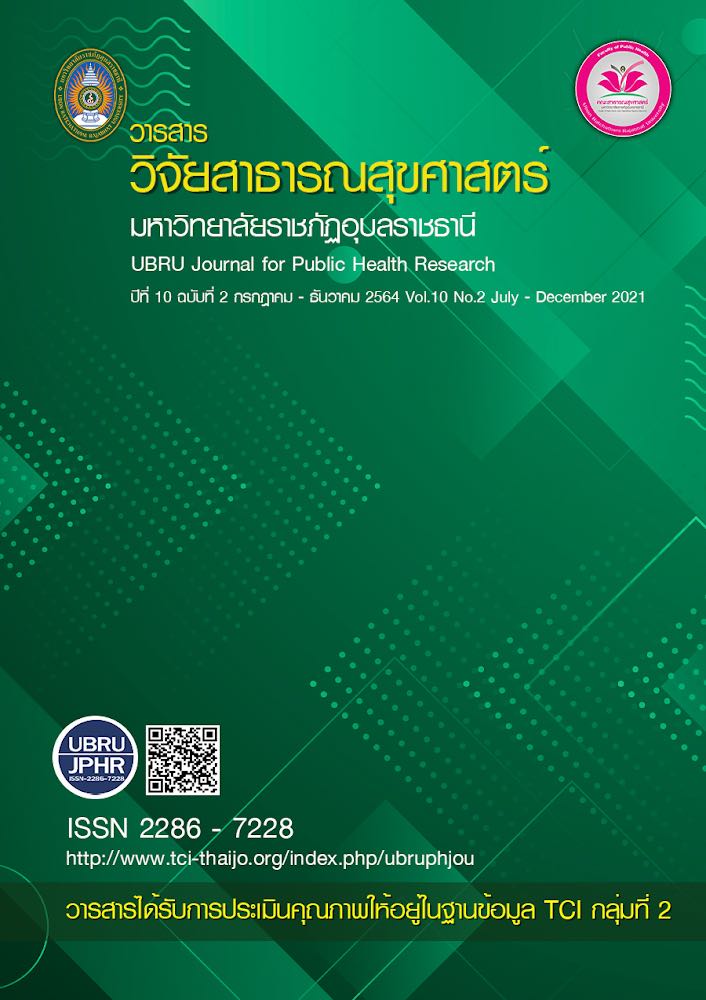Association between health belief and preventive behaviors regarding coronary artery disease among patients of metabolic syndrome
Keywords:
Health belief model, preventive behaviors, coronary artery disease, metabolic syndromeAbstract
Morbidity with coronary artery disease (CAD) were more likely, affecting the quality of life of the population. This cross-sectional analytical study aimed to investigate factors related to CAD preventive behaviors among patients with metabolic syndrome. Data were collected with 138 diabetic patients with hypertension and / or hyperlipidemia with metabolic syndrome who received service in a chronic disease clinic at Bua Wat Subdistrict Health Promotion Hospital, Warin Chamrap District, Ubon Ratchathani Province. A simple random sampling was performed using an interview questionnaire with the confidence alpha coefficients between 0.73 - 0.83. Data were analyzed by descriptive statistics and pearson product - moment correlation coefficients.
The results showed that the CAD preventive behaviors of the sample group were at a good level (78.99%). The perception of risk opportunities, benefit, barriers and self-efficacy of CAD preventive behaviors were statistically significant positively correlations with CAD preventive behaviors (r=0.202, p=0.018, r=0.333, p<0.001, r=0.342, p<0.001 and r=0.513, p<0.001, respectively).
Therefore, health professionals should develop activities to modify health behavior of people risk with metabolic syndrome with a focus on increasing the perception of risk opportunities, benefits, obstacles, and self-efficacy in order to have cardiovascular disease prevention behavior.
References
กรมควบคุมโรค กระทรวงสาธารณสุข. (2561). อัตราป่วยรายใหม่ของผู้ป่วยโรคหัวใจและหลอดเลือด. [ออนไลน์]. เข้าถึงได้จาก: https://hdcservice.moph.go.th/hdc/reports/report.php?source=formated/format_1.php&cat_id=6a1fdf282fd28180eed7d1cfe0155e11&id=f346e9d449b04c07cc80edeefc0cc360. [สืบค้นเมื่อ 3 เมายน 2563].
กิตติคุณ ยั่งยืน. (2559). ภาวะอ้วนลงพุงหรือภาวะเมแทบอลิกซินโดรม. [ออนไลน์]. เข้าถึงได้จาก: https://www2.gpo.or.th/Portals/6/Newsletter/RDINewsYr23No2-5.pdf. [สืบค้นเมื่อ 6 เมายน 2563].
นพนัฐ จำปาเทศ และคณะ. (2561). ปัจจัยที่มีความสัมพันธ์กับพฤติกรรมป้องกันโรคหลอดเลือดหัวใจของผู้สูงอายุที่มีภาวะเมตาบอลิกซินโดรม.วารสาร มฉก.วิชาการ, ปีที่ 22 (ฉบับที่ 43-44). 114-129
พิภพ ดีแพ และคณะ. (2562). ปัจจัยที่มีความสัมพันธ์กับพฤติกรรมสร้างเสริมสุขภาพเพื่อป้องกันโรคหัวใจและหลอดเลือดในผู้ป่วยโรคเบาหวานร่วมกับความดันโลหิตสูง. วารสารวิจัยสุขภาพและการพยาบาล, ปีที่ 33 (ฉบับที่ 3). 46-59.
เมธิกานต์ ทิมูลนีย์ และสุนิดา ปรีชาวงษ์. (2559). ปัจจัยที่มีความสัมพันธ์กับพฤติกรรมป้องกันโรคหัวใจและหลอดเลือดในพนักงานทำความสะอาดวัยก่อนหมดประจำเดือน. วารสารเกื้อการุณย์, ปีที่ 23 (ฉบับที่ 4).118-132.
วราพรรณ วงษ์จันทร์. (2561). ภาวะเมตาบอลิกซินโดรมวัยผู้ใหญ่:การจัดการตนเอง. วารสารพยาบาลทหารบก, ปีที่ 19 (ฉบับพิเศษ).16-29.
สายทอง ภูแม่นเขียน. (2556). ความสัมพันธ์ระหว่างการรับรู้ประโยชน์ของการกระทำและการรับรู้
สมรรถนะแห่งตนกับพฤติกรรมส่งเสริมสุขภาพผู้สูงอายุโรคหลอดเลือดหัวใจที่มารับการรักษาในคลินิกโรคหัวใจโรงพยาบาลกาฬสินธุ์ จังหวัดกาฬสินธุ์. วิทยานิพนธ์พยาบาลศาสตรมหาบัณฑิต. คณะพยาบาลศาสตร์.มหาวิทยาลัยบูรพา.
American Heart Association. (2004). Definition of Metabolic Syndrome. [Online]. Available from:
https://www.ahajournals.org/doi/epub/10.1161/01.CIR.0000111245.75752.C6. [cited 2019 April 30].
Bandura A. (1989). Human agency in social cognitive theory. Am Psychol, 44(9):1175-1184.
Becker, M.H. (1977). The Health Belief Model and Prediction of dietary Compliance: A field Experiment. Journal of Health and Social Behavior, 18 348-366.
Best, John W. (1981). Research in Education. 3rd ed. Englewood cliffs, New Jersey: Prentice. Hall Inc.
Buchner, A. (2010). G*Power: Users Guide – Analysis by design. Web Page of Heinrich Heine-Universitat-Institut fur experimentelle Psychologie.
Carpenter CJ. (2010). A meta-analysis of effectiveness of health belief model variables in predicting behavior. Health Communication, 25(8).661-669.
Cohen J. (1977). Statistical power for the behavioral sciences. 2nd ed. New York: Academic Press.
Horwood H, Williams MJ, Mandic S. (2015). Examining motivations and barriers for attending maintenance community-based cardiac rehabilitation using the health-belief model. Heart Lung Circ, 24(10).980-987.
Laudisio A, Bandinelli S, Gemma A, Ferrucci L, Incalzi RA. (2014). Metabolic syndrome and functional ability in older age: The InCHIANTI study. Clin Nutr, 33(4).626-633.
Lo SW, Chair SY, Lee FK. (2015). Factors associated with health-promoting behavior of people with or at high risk of metabolic syndrome: based on the health belief model. Appl Nurs Res, 28(2).197-201.
Samson SL, Garber AJ. (2014). Metabolic syndrome. Endocrinol Metab Clin North Am, 43(1).1-23.
World Health Organization. (2019). The top 10 causes of death. [Online]. Available from: https://www.who.int/news-room/fact-sheets/detail/the-top-10-causes-of-death. [cited 2019 April 22].
Downloads
Published
How to Cite
Issue
Section
License
เนื้อหาและข้อมูลในบทความที่ลงตีพิมพ์ในวารสารวารสารวิจัยสาธารณสุขศาสตร์ มหาวิทยาลัยราชภัฏอุบลราชธานี ถือเป็นข้อคิดเห็นและความรับผิดชอบของผู้เขียนบทความโดยตรงซึ่งกองบรรณาธิการวารสาร ไม่จำเป็นต้องเห็นด้วย หรือร่วมรับผิดชอบใดๆ
บทความ ข้อมูล เนื้อหา รูปภาพ ฯลฯ ที่ได้รับการตีพิมพ์ในวารสารนี้ ถือเป็นลิขสิทธิ์ของวารสารฯ หากบุคคลหรือหน่วยงานใดต้องการนำทั้งหมดหรือส่วนหนึ่งส่วนใดไปเผยแพร่ต่อหรือเพื่อกระทำการใดๆ จะต้องได้รับอนุญาตเป็นลายลักอักษรณ์จากบรรณาธิการวารสารนี้ก่อนเท่านั้น


